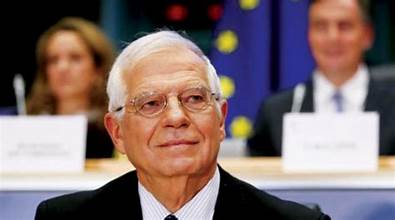Two-state solution in the Israel-Palestine conflict
The EU’s foreign policy chief, Josep Borrell urges two-state solution in the Israel-Palestine conflict.
Borrell stated that Israel’s attempt to destroy the Palestinian group Hamas in Gaza through military means is not effective.
Ahead of talks with Israeli and Palestinian diplomats, he criticized Israeli Prime Minister Benjamin Netanyahu’s rejection of calls for a Palestinian state after the Gaza war.
Borrell stressed that peace cannot be achieved solely through military actions, and he echoed the UN’s condemnation of Netanyahu’s stance as “unacceptable.”
Borrell called for dialogue to discuss alternative solutions, rejecting ideas like forcing Palestinians to leave or engaging in violence against them.
Bloc’s 27 foreign ministers Meetings:
The EU’s 27 foreign ministers will meet separately with counterparts from Israel, the Palestinian Authority, and key Arab states in Brussels.
The meetings take place as violence in the Gaza Strip continues.
German Foreign Minister Annalena Baerbock supports a two-state solution, describing it as the “only solution” for peaceful coexistence between Israelis and Palestinians.
Baerbock criticized those opposing this solution, stating they have not presented any alternatives.
She also called for an urgent “humanitarian pause” amid what some governments and rights groups describe as a genocidal campaign in Gaza.
Netanyahu Hard Stance:
Netanyahu, citing it as an existential danger to Israel, rejects the idea of a Palestinian state. Borrell criticizes Israel’s one-sided objective, stating that it is problematic to allow Israel to decide when Hamas is weakened. The three-month-old war in Gaza has caused over 25,000 Palestinian casualties. Most of the 2.3 million population in Gaza has been displaced. Israel plans to prolong the war for “many months.” The goals include eradicating Hamas, freeing Israeli captives, and ensuring Gaza no longer poses a security threat.
The conflict in Gaza has heightened tensions in the Middle East and raised concerns about a broader regional conflict.
EU Diplomatic Service:
The EU’s diplomatic service presented a discussion paper to its 27 member countries. The paper presents a peace road map for the Israeli-Palestinian conflict. The plan recommends a preparatory peace conference. The conference would be led by the EU, Egypt, Jordan, Saudi Arabia, and the League of Arab States. The EU would invite the US and UN as conveners for this conference. If either party decides not to participate, both parties will engage in consultations throughout the talks.The aim is to develop a peace plan.
A key goal outlined in the internal document is the establishment of an independent Palestinian state living peacefully alongside Israel. Netanyahu’s office highlighted Israel’s need for security control over Gaza. This emphasis came after a call with US President Joe Biden. The objective is to eliminate the threat to Israel. This stance contradicts the demand for Palestinian sovereignty.
















